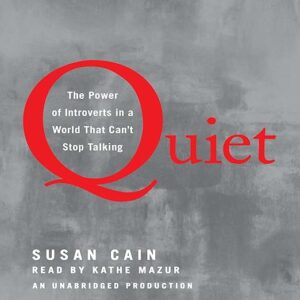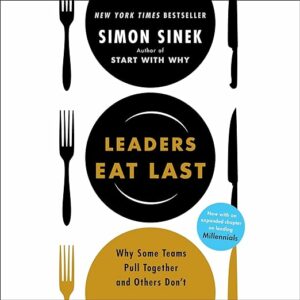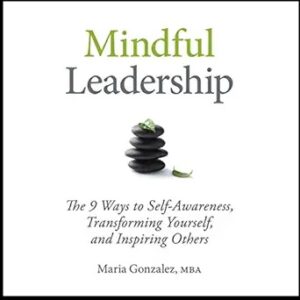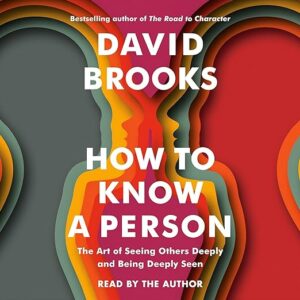
Top 4 Books for Introverted Leaders
As an introvert, you witness from a young age that being extroverted is rewarded, at least that is the case in most Western cultures. Introverted children (even adults) get labeled as “shy” and sometimes more severe terms are used, such as “reclusive” or “anti-social”. We witness in schools, workplaces, and our social groups that the extroverts get most of the accolades and recognition. Even at work, introverts can get passed over. But it doesn’t have to be this way.
In this blog post, I outline some of the books that increased my self-awareness and helped me kickstart my career as an introverted leader.
Top Books for the Introverted Leader (in no particular order)
1. Quiet: The Power of Introverts in a World That Can’t Stop Talking by Susan Cain

Susan Cain’s book, Quiet, explores all of the positive things about introverts, and how much we as a society lose from undervaluing them. Cain empowers introverted people to use their introvert tendencies and power to their advantage. She outlines strategies and ways to ensure introverts can find balance in a gregarious and loud world. Cain’s writing also paves the path for meaningful and open communication between Extroverts and Introverts.
In my experience, I spent many years fighting my introversion. I did everything I could to “put myself out there”, “be more social and friendly”, and “raise my hand” more. But, of course, this doesn’t come naturally to someone that’s quite introverted and I spent a lot of energy trying to be something I was not. This can be an exhausting effort. And more often than not, it’s not sustainable or effective. As introverted leaders, we need to view our unique talents as our super power and lean into it like any other strength.
Why you should read this book: This book will change the way you view introversion and build confidence that your natural style is something to be proud of.
2. Leaders Eat Last: Why Some Teams Pull Together and Others Don’t by Simon Sinek

In Leaders Eat Last, Simon Sinek explores leadership and its impact on organizational success. He articulates how the best leaders prioritize the well-being and safety of their teams, defining the meaning behind the concept of the circle of safety and presenting various examples from history and modern organizations, such as the Marines, Southwest Airlines, and the tech company Zappos, to illustrate his points.
Sinek then gets into the science of human behavior and hormones. He describes how feelings of well-being and safety can create an environment where the production of oxytocin (the happiness hormone) can be stimulated, ultimately leading to better outcomes, engagement, and, last but not least, loyalty.
Leaders Eat Last drives home the importance of building a culture of deep relationships and trust. The more we prioritize the well-being of our teams, understand ways to inspire them, and help them feel safe, the more effective leaders we will be.
Why you should read this book: While not geared specifically towards introverted leaders, the lessons are valuable for those (like myself) who naturally take longer to build connections and trust with others. This book will help you be intentional about building deep connections and relationships faster and with ease.
3. Mindful Leadership: 9 Ways to Self-Awareness, Transforming Yourself, and Inspiring Others by Maria Gonzalez

Mindfulness is a topic that often comes up in our lives, as it involves managing day-to-day stressors, regulating our emotions and nervous system, and even being a useful parenting tool. But we seldom think about mindfulness regarding how we lead. Or at least, I didn’t consider it until I read Maria Gonzalez’s book.
In her book, Gonzalez outlines how to develop nine useful skills (being present, aware, calm, focused, clear, equanimous, positive, compassionate, and impeccable) and overcome five hindrances to success (attachment, aversion, ignorance/confusion/delusion, envy/jealousy, and pride).
Why you should read this book: The nine skills in Mindful Leadership will help you reflect and think clearly in stressful situations. These practices could be useful in any area of our lives, but for me, have been even more impactful in business settings where the stakes are sometimes high, and I have found myself under pressure to perform.
4. How to Know a Person: The Art of Seeing Others Deeply and Being Deeply Seen by David Brooks

How to Know a Person is a book that validated my every introverted experience. From the start, the author had me saying, “Yes, I have felt that!” Blending neuroscience, psychology, and storytelling, Brooks illuminates both the skills and art of building meaningful relationships.
It’s a pretty well-known fact that introverts are great listeners but may not always be the best at asking questions. This is where this book came through for me. While I am an introverted individual, I often find myself in situations where others willingly open up to me and tell me their challenges, ask for advice, or just want to talk things through. But I don’t always find it easy to naturally draw things out of others when they aren’t being as open or willing to share. This has hindered my success as a leader in the early stages of my journey. By not asking good questions and understanding those I work with on a deeper level, I cannot always support my team members to the best of my ability. Brooks sets out to help us do just that: understand how to see and know a person deeply and make them feel seen and understood.
Why you should read this book: This book brings tangibility to relationship-building and will help even the most introverted leader understand how to connect with other humans.
Conclusion
As introverted leaders, we may have to work against strong cultural biases about how effective we can be. But I’m here to tell you that quiet leadership can be just as effective and, in many situations, can be more effective than the common extroverted counterparts we witness. It takes practice, mindfulness, and the power to really lean into our natural wiring in order to succeed.
To be an effective leader, embrace your introverted strengths. Use tools like the Predictive Index Behavioral Assessment™ to stay authentic, build strong relationships, and communicate sincerely. Add these books to your library loans (or your Audible wish list) and continue bravely paving your journey as an introverted leader.
Explore more: Introverts are leaders, too
Start Your Journey to Organizational Excellence
Begin your journey with MindWire by your side. Contact us today and let’s discuss how to elevate your business together.


